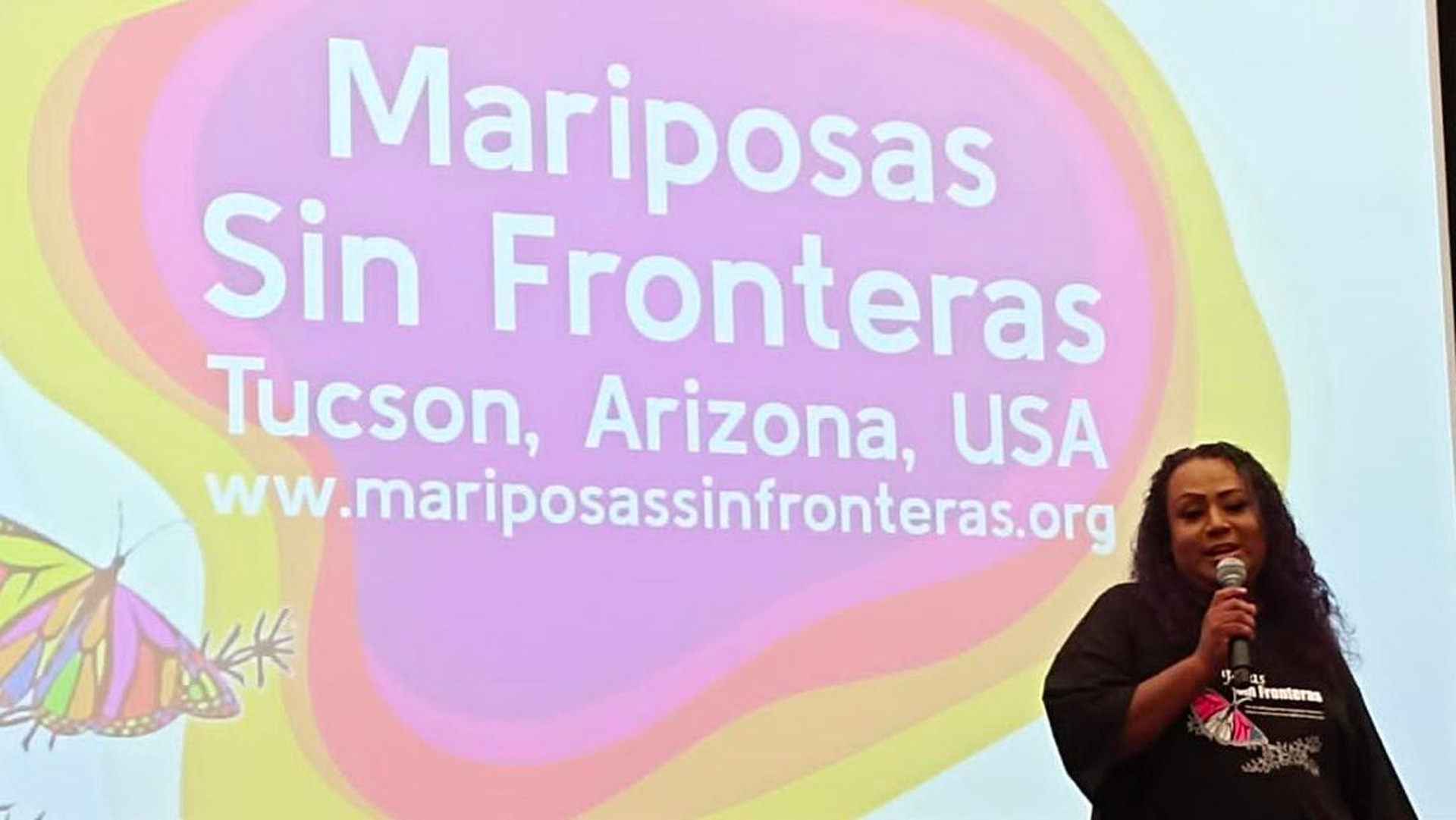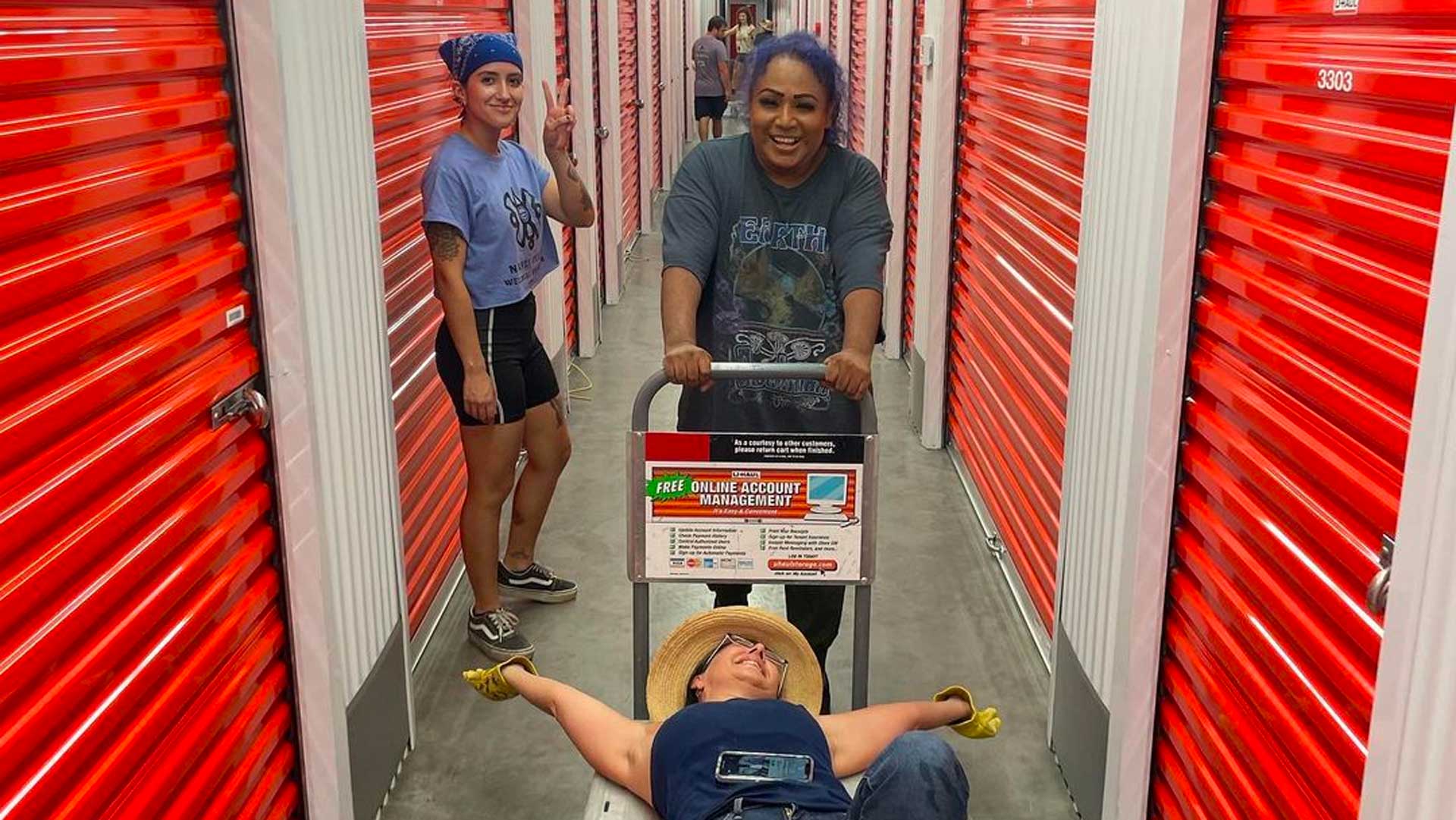 Karolina Lopez Barrera, Mariposas sin Fronteras executive director, speaks at an international conference in Germany last year.
Karolina Lopez Barrera, Mariposas sin Fronteras executive director, speaks at an international conference in Germany last year.
When Karolina Lopez Barrera entered the country undocumented, officials kept her in immigration detention for three years.
“I spent three years in detention. I had three years with men where I suffered being raped, beatings and psychological abuse,” she said in Spanish. “I came out with depression, a stress that even though I’ve been out for more than 10 years, I continue to suffer from.”
Ari Sawyer, a border researcher with Human Rights Watch, says while all migrants are vulnerable, migrants who are LGBTQ are particularly vulnerable and often targeted for abuse, both in Mexico and in detention in the U.S.
“So that’s one of the major issues — whether that person is gay, a lesbian, they are conspicuously queer, then they are routinely targeted for abuse that goes above and beyond the already egregious abuses that migrants face,” they said.
New asylum rules have more migrants waiting in Mexico for an opportunity to seek asylum, rather than in the U.S. Sawyer has documented dozens of instances where Mexican security forces committed abuses against LGBTQ people, including high levels of sexual assault.
“It’s just constant anxiety, all of which combined means that LGBTQ migrants are at particular risk of PTSD, depression, anxiety and a host of other very serious mental health concerns as a result of these abuses,” they said.
Sawyer says a lot of trans migrants are fleeing their home countries because of discrimination but also because they often lack access to gender-affirming care.
Lopez won her political asylum case and got out of detention in 2012. The next year she founded Mariposas Sin Fronteras, a nonprofit that helps LGBTQ migrants, especially transwomen, who are in detention, have just been released or are in immigration proceedings.
“When I was inside, I needed someone to visit me,” she says. “Nobody came to visit me. So, I wanted a visit, someone to send me a letter. I did not receive any letters except from the government, which denied my case ... No one was waiting for me outside.”
One of the things Mariposa Sin Fronteras does is “cartas y visitas,” sending cards to and visiting LGBTQ migrants in detention in Arizona.
In 2016, Lopez opened Casa Mariposa, where migrants can live for 6 months to a year free of charge. Casa Mariposa can also connect them with clinics for health services, mental health services, English classes, food and basic necessities.
Casa Mariposa has been slowly working on upgrades for the house, with lots of help from the community. Anyone who wants to get involved, can follow them on Instagram and see what they’re doing.

 Volunteers from programs and organizations like The Community Food Bank, Native Seed Search, and Sowing Remedies Youth Program volunteered at Casa Mariposa's Garden Day, shaping garden areas, installing a French drain, leveling the ground and structuring the yard to take advantage of the rain in August 2022.
Volunteers from programs and organizations like The Community Food Bank, Native Seed Search, and Sowing Remedies Youth Program volunteered at Casa Mariposa's Garden Day, shaping garden areas, installing a French drain, leveling the ground and structuring the yard to take advantage of the rain in August 2022.
Two years ago, Lopez got her US citizenship, but she says being a transwoman, the discrimination continues.
Lopez says the trans community has the same needs they’ve always had, including access to medical care, access to work and a living that’s not discriminatory and laws that protect them.
“We want to create a safe place for the transgender community,” she said. “This house will be an example to other places that could be a safe space for the community, that people can come here and feel safe.”


By submitting your comments, you hereby give AZPM the right to post your comments and potentially use them in any other form of media operated by this institution.